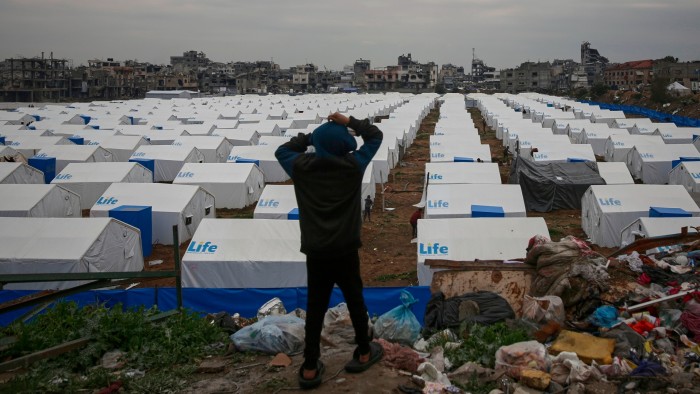The United States and Israel have been reaching out to countries in East Africa in an attempt to relocate Palestinians from Gaza as part of President Donald Trump’s controversial plan to transform the war-torn region into a “Riviera of the Middle East”. Sources familiar with the matter revealed that Israeli officials, led by strategic affairs minister Ron Dermer, have been in discussions with the governments of Somalia and Sudan, both countries plagued by internal conflicts. Meanwhile, US diplomats have been engaging with the breakaway province of Somaliland.
While these talks are still in the early stages, it has been reported that Israel is exploring options with various countries worldwide, including those in Africa, regarding the potential resettlement of Gazans. A US official disclosed that initial conversations have taken place with Somaliland about potentially recognizing the de facto state in exchange for establishing a military base near the port of Berbera on the Red Sea coast. However, the relocation of refugees from the US and Gaza is not the primary focus of these discussions.
The proposal to relocate the majority of Gaza’s 2 million residents was first introduced by President Trump as a part of his plan to take control of the territory following months of conflict between Hamas and Israel. The plan has faced widespread condemnation from Arab states, European powers, and Palestinian leaders, who vehemently oppose any displacement of Palestinians. Despite initial support from Israeli Prime Minister Benjamin Netanyahu, the international community has rejected the idea of evicting Gazans from their homes.
As the discussions continue, it remains uncertain whether any East African country would be willing to accept large numbers of Palestinian refugees. Somalia, a member of the Arab League, has reiterated its stance that Gaza belongs to Palestinians and will remain as such. Similarly, the prospect of a deal with Sudan seems unlikely due to the country’s ongoing civil war and political instability.
While the Trump administration has expressed interest in exploring various options for Gaza’s future, including the possibility of relocating residents, the complex geopolitical dynamics in the region make any significant progress challenging. As international mediators continue to seek solutions to the conflict between Hamas and Israel, the fate of Gaza’s population hangs in the balance. In today’s fast-paced world, it can be easy to feel overwhelmed by the constant barrage of information and demands on our time. From work deadlines to social commitments to family responsibilities, it can often feel like there is never enough time in the day to get everything done.
This feeling of being overwhelmed can lead to stress, anxiety, and burnout, which can have a negative impact on our mental and physical health. That’s why it’s important to take steps to manage our time effectively and create a sense of balance in our lives.
One way to do this is by practicing mindfulness. Mindfulness is the practice of being present in the moment and fully engaged in whatever you are doing. It involves paying attention to your thoughts, feelings, and surroundings without judgment, and can help you to feel more calm, focused, and in control.
One simple way to incorporate mindfulness into your daily routine is to take a few minutes each day to practice deep breathing exercises. This can help to calm your mind and reduce stress, allowing you to approach your tasks with a sense of clarity and focus.
Another important aspect of time management is prioritizing your tasks. It’s easy to get caught up in the busyness of everyday life and feel like you’re constantly playing catch-up. But by taking the time to identify your most important tasks and prioritize them accordingly, you can ensure that you are focusing your time and energy on the things that matter most.
One helpful tool for prioritizing your tasks is the Eisenhower Matrix, which categorizes tasks into four quadrants based on their urgency and importance. By using this framework, you can quickly identify which tasks require your immediate attention and which can be delegated or postponed.
In addition to prioritizing your tasks, it’s also important to set boundaries and learn to say no when necessary. It’s easy to feel pressured to say yes to every request that comes your way, but this can lead to feeling overwhelmed and overextended. By setting boundaries and only taking on tasks that align with your priorities and values, you can create a sense of balance in your life and avoid burnout.
Finally, it’s important to make time for self-care and relaxation. Taking care of yourself is essential for maintaining a healthy work-life balance and preventing burnout. Whether it’s taking a walk in nature, practicing yoga, or simply spending time with loved ones, finding activities that bring you joy and relaxation can help to recharge your batteries and improve your overall well-being.
In conclusion, managing your time effectively and creating a sense of balance in your life is essential for maintaining your mental and physical health. By practicing mindfulness, prioritizing your tasks, setting boundaries, and making time for self-care, you can create a more fulfilling and harmonious life for yourself. Remember, it’s important to take care of yourself first so that you can better care for others.








